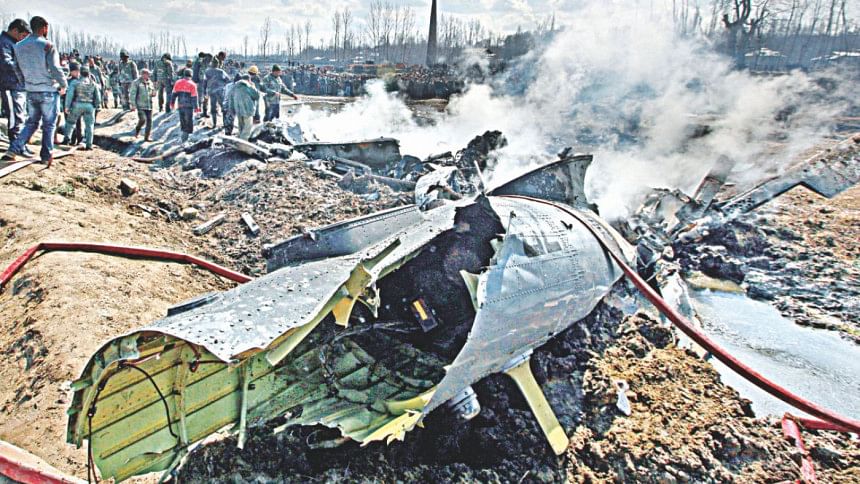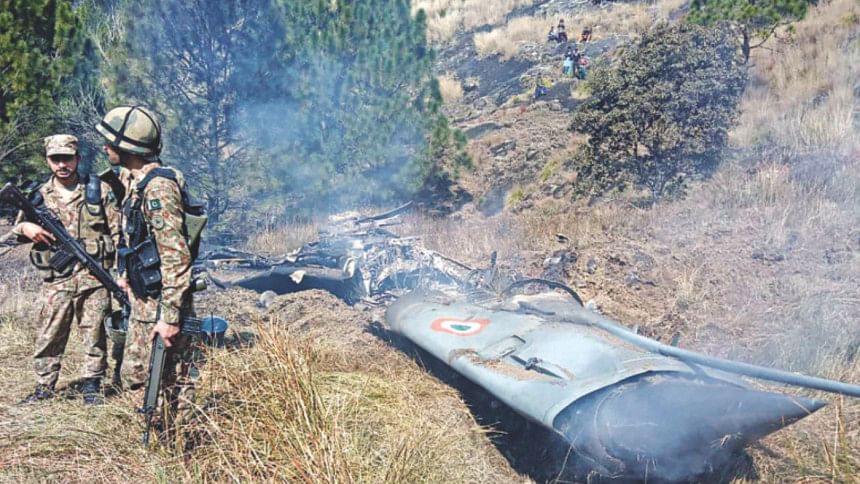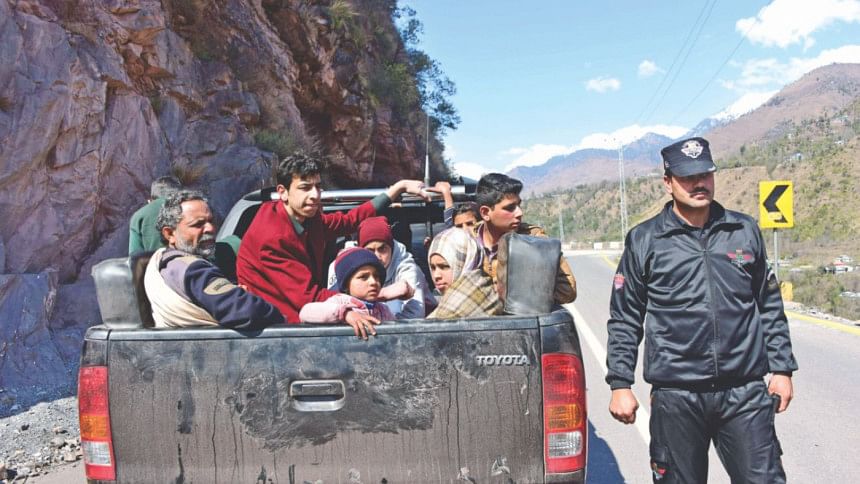Tension spirals

India and Pakistan both said they shot down each other's fighter jets yesterday, with Pakistan capturing an Indian pilot a day after Indian warplanes struck inside Pakistan for the first time since 1971, prompting world powers to urge restraint.
Calling for talks with India to defuse the situation, Pakistan Prime Minister Imran Khan warned of the potentially catastrophic consequences should "better sense" not prevail.
"Can we afford any miscalculation with the kind of weapons that we have and you have? If this escalates, things will no longer be in my control or in Modi's," he said in a televised statement referring to the Indian prime minister.
While both sides have sought to play down the threat of war, the rare aerial engagement over the divided and disputed territory of Kashmir significantly raises the stakes in a standoff sparked by a suicide attack on the Indian-controlled side earlier this month.
Pakistan initially said it downed two Indian jets in its airspace and captured two pilots, but later its military spokesman tweeted that there was "only one pilot" in Pakistani custody.
India's foreign ministry demanded the "immediate and safe return" of the pilot, calling on Pakistan to ensure no harm comes to him.
New Delhi confirmed the loss of one of its planes and said it had shot down a Pakistani fighter jet.
In a sign of the deepening crisis, Pakistan closed its airspace "until further notice". India shut several airports in the northern part of the country temporarily, leading to dozens of domestic flight cancellations. Operations at the Indian airports have now resumed.

"We do not want to go towards war," Pakistan's military spokesman Major General Asif Ghafoor told a press conference.
Ghafoor said the jets had been shot down after Pakistani planes earlier flew across the Line of Control, the de facto border in Kashmir, to the Indian side in a show of strength, hitting non-military targets including supply depots.
Afterwards, he said, the two Indian planes crossed the LoC into Pakistani airspace and were shot down. One fell in to Pakistani-held Kashmir, while the second crashed on the other side, he said.
He denied initial reports that a Pakistan plane had been shot down, saying accounts an F-16 had been lost were incorrect as none was used in the action.
Later, Indian foreign ministry spokesman Rajeesh Kumar said a Pakistani jet was hit as it took part in an operation "to target military installations on the Indian side".
Pakistan state media published a video purportedly showing the captured pilot being interrogated.
It shows a blindfolded man in an Indian Air Force uniform, his face bloodied, with his hands tied behind him, giving his name, rank and serial number as a soldier interrogates him.
The military later released a second video showing the man without a blindfold and drinking a cup of tea.
Separately, five people were killed when an IAF helicopter crashed in Budgam district of Jammu and Kashmir, Times of India reports.
Four of the victims are believed to be IAF personnel.
The chopper crashed in an open field near Garend Kalaan village around 10:05am.
The incidents are the latest in a dangerous sequence of events between the two countries, whose ties have been under intense strain since the February 14 suicide bombing in Indian Kashmir that killed 40 troops.
New Delhi had promised to act, and on Tuesday its warplanes flew into Pakistani airspace and struck what it said was a camp of Jaish-e-Mohammed (JeM), the militant group that claimed the Kashmir bombing.
After the strike India said its warplanes struck a militant training camp inside Pakistan, killing "a very large number" of fighters, though Pakistan officials denied there had been any casualties.
It was India's first air strike on Pakistani soil since 1971 -- when neither had nuclear weapons.
Islamabad, while denying the Indian strike caused any major damage or casualties, quickly vowed to retaliate, fuelling fears of a disastrous confrontation in South Asia.

Earlier yesterday, India's foreign minister sought to ease the situation by downplaying Tuesday's strike, repeating Indian claims that it had been a pre-emptive attack on JeM.
"India does not wish to see further escalation of this situation," Sushma Swaraj said during a visit to China.
The US, along with China, Russia, Britain and the European Union, have called for cooler heads to prevail.
"We encourage India and Pakistan to ... avoid escalation at any cost," US Secretary of State Mike Pompeo said.
China yesterday again urged the two sides to "exercise restraint" and seek dialogue. Britain said it was "deeply concerned" and working with partners including the UN Security Council to defuse tensions.
The confrontation represents the first major foreign policy crisis for Pakistan's leader, who is believed to be close to the powerful military and who came to power last year vowing to seek dialogue with New Delhi.
The conflict also comes at a critical time for Indian Prime Minster Narendra Modi, who faces a general election in a matter of months.
Modi's decision to order air strikes could benefit him politically, according to analysts and pollsters, but he was accused yesterday by opposition parties of capitalising on conflict.
Congress leader Rahul Gandhi criticised the "blatant politicisation of the sacrifices made by our armed forces", in a joint statement by 21 opposition parties, the first time they have broken ranks with the government over the issue.
Pakistan has denied involvement in the Kashmir bombing on February 14.
While India has consistently accused its neighbour of supporting extremist groups, Pakistan has equally vehemently denied any role in attacks in India and its only Muslim-majority state, Kashmir.
The Himalayan region has been divided between India and Pakistan since independence in 1947. They have fought two of their three wars over the territory.

 For all latest news, follow The Daily Star's Google News channel.
For all latest news, follow The Daily Star's Google News channel. 



Comments